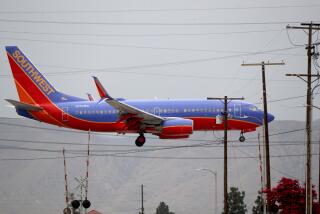Executive Travel : Travel Policies Are All Over the Map
- Share via
Business travel policies vary widely among companies. Where one company flies its employees first-class and puts them up in luxury hotels with generous meal allowances, another puts them up in budget inns and makes them absorb some of their own meal costs.
And with the Internal Revenue Service cutting back on the deduction employees can take for any non-reimbursed business meals and entertainment expenses, many workers are wondering how their companies stack up in the travel reimbursement department.
Now they can know. The Bureau of National Affairs, a Washington-based research group, recently surveyed 617 companies in a cross-section of industries to find out what their travel reimbursement practices are.
Of the companies polled, 65% are small (fewer than 1,000 employees) and 35% have more than 1,000 workers.
Of those surveyed, 85% impose some kind of restraint on spending for business travel. The restraints range from requiring people to use certain airlines or hotels to putting spending caps on meal allowances. In general, companies said they encourage employees to use “reasonable judgment” when planning their trips and to try to find the least expensive, but practical, way of getting to where they are going.
Here is a rundown of various reimbursement practices.
AUTOMOBILES: While 99% of the respondents said they pay employees who use their cars for business, mileage reimbursement rates varied from 16 cents a mile to 39 cents a mile. The median rate reported was 28 cents, the same amount the IRS allows for business use of a car.
The median rate is up from 26 cents a mile two years ago. Only 7% of the companies said they pay more than 28 cents a mile, and only 9% pay less than 23 cents.
However, with the IRS allowance increasing to 29 cents for 1994, more than half the respondents said they planned to increase their reimbursements to keep pace with the IRS.
For employees who use their cars to get to the airport, 92% of the companies said they pay airport parking expenses, and only 6% of those place restrictions on the reimbursement amounts. Of those that do have restrictions, for example, a few said they pay only for cars parked in long-term or remote lots. Others require employees to use a taxi or limousine if it would be less expensive than parking for a long trip.
MEALS: More than three-quarters (77%) of the companies said they pay the actual cost of their employees’ meals when they are out of town on business and that they set no limits on what they pay. However, 22% do specify limits for reasonable meal costs. Health care facilities, educational and government institutions were more likely to restrict meal reimbursements than were manufacturing companies or service firms.
For those companies that put spending caps on meals, about three-quarters said meals should cost no more than $25 to $35 per day.
Only a few companies (about 9%) specified maximums for individual meals, such as breakfast, lunch and dinner.
Some companies also figure different allowances for different travel destinations. The amount paid for traveling within the company’s home state, for example, might be lower than for travel outside it.
LODGING: Only 10% of the companies surveyed have caps on how much their employees can spend on lodging. For those, the median cap is $67.50 per day. And in more than half those cases, it varies by travel destinations. None of the survey respondents said they planned to increase their travel allowance maximums for 1994.
AIR FARES: Sixty percent of companies require employees to fly coach rather than first-class, although half those with this restriction also said it could be lifted in certain cases, such as when there are no coach reservations available.
The ban on first-class travel was also lifted by 22% of companies for international flights or flights more than four hours long. Some companies also lift the ban if employees are traveling with clients. Otherwise, employees who want to fly first-class have to use their own frequent-flier awards to get the upgrade.
In some companies, however, even that is not allowed. Thirty percent of the companies said their coach-only rule applies at all times.
When making travel arrangements, only 4% of the respondents require employees to use designated travel agencies, although half said they expect employees to purchase the least expensive ticket possible.
And about a quarter of them encourage companies to use company cars instead of flying, whenever practical.
Also, about 13% said they would encourage weekend stays if it saved the company money on air fares.
The majority of companies (60%) still allow employees to use frequent-flier mileage earned on company travel for their personal trips.
About 25% have no policy regarding personal use of travel awards. Only 9% reclaim the miles for use by the company for future business trips.
Employer Expectations
Percent of institutions and businesses that place each standard restriction on business travelers. Exceptions to such rules are normally made when they are burdensome or impractical.
Use of coach class accomodations: 60% Purchase lowest-cost tickets: 45 Use automobile instead of air or rail transportation: 26 Travel must include weekend stay: 13 Schedule departures during non-peak periods: 12 Use alternative mode of transportation to air travel: 8
Source: Survey of 617 institutions and businesses by the Bureau of National Affairs.
More to Read
Sign up for The Wild
We’ll help you find the best places to hike, bike and run, as well as the perfect silent spots for meditation and yoga.
You may occasionally receive promotional content from the Los Angeles Times.






